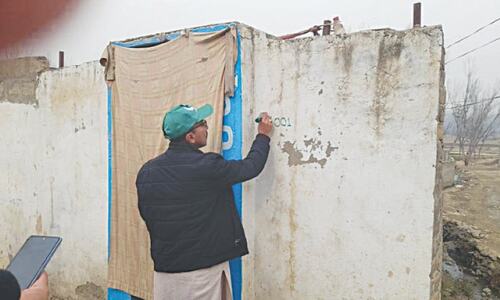
KABUL: Afghanistan's harshest winter in two decades has killed dozens of people, but heavy snow has brought prospects of an end to drought and bumper crops for farmers – including those in the opium trade.
Wheat and other cereals are Afghanistan's traditional food crops, but agriculture has been hit hard by 30 years of war and a decade of drought, driving many farmers to grow the far more lucrative opium poppies.
Afghanistan grows about 90 per cent of the world's opium, according to the UN drugs and crime office UNODC.
It estimates that export earnings last year from Afghan opiates were worth $2.4 billion – equivalent to 15 per cent of GDP.
“Last year around 70 per cent of our crops died because of drought,” agriculture ministry spokesman Majid Qarar told AFP.
“This year the snow and rainfall is more than the average of what we had in the past 10 years.”
“It gives us hope of a good and productive year ahead.”
Three out of four Afghans are involved in agriculture, but the mountainous and largely barren country is almost totally dependent on erratic winter snows and spring rains for water.
Drought cut last year's cereal crop by 20 per cent over the previous year to 4.44 million tonnes, according to the agriculture ministry.
“We are hoping to increase the cereal production to nine million tonnes in the coming years,” Qarar said, adding that the ministry had already started distributing around 20,000 tonnes of fortified seeds to farmers.
“Our fields were burned and barren for years, we now have seeds and water to cultivate – it is going to be a good year,” said Gulab Jan, a farmer on the outskirts of Kabul.
The Afghan economy has always been based on agriculture, despite the fact that only 13 per cent of its total land is arable and just eight percent is currently cultivated.
According to UN data about half of Afghanistan's estimated 30 million population faces food shortages caused by continuous drought over the past decade.
US led Nato forces fighting a 10-year Taliban insurgency in Afghanistan have tried to stamp out the poppy economy, encouraging farmers to diversify into highly-priced crops such as the spice saffron.
“We are expanding the cultivation of saffron to 18 provinces of the country,” Qarar said.
“We are also planning to plant three million trees.” A spokesman for the counter narcotics ministry, Abdul Qayum Samir, said a survey was under way but it was too soon to predict any changes in poppy cultivation this year.












































Dear visitor, the comments section is undergoing an overhaul and will return soon.